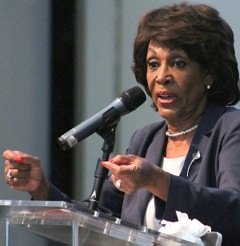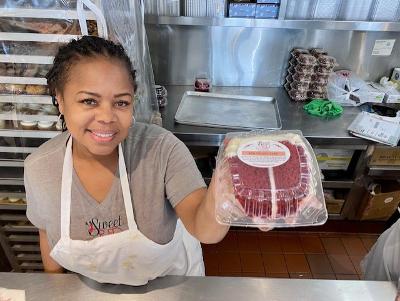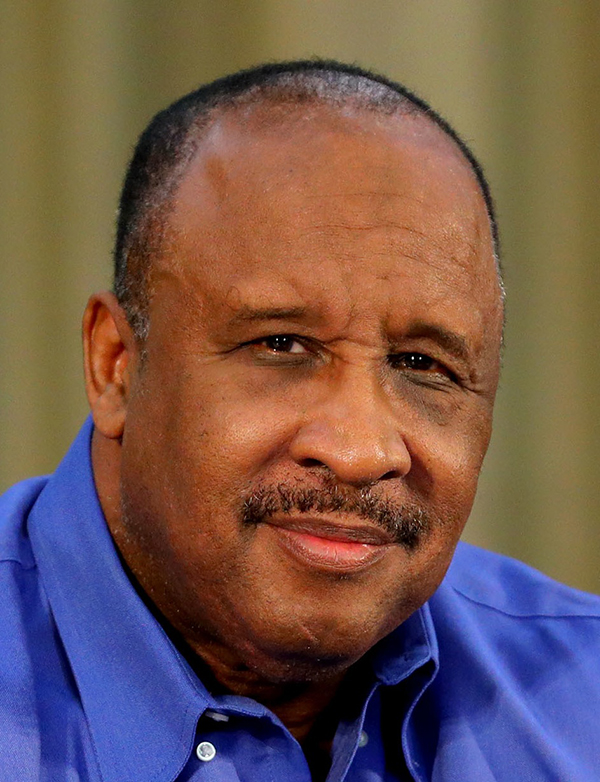
INGLEWOOD — Cyndrea Mathews spent years greeting customers by name as they walked into her sunlit salon near the edge of Culver City and Inglewood. On any given Saturday, the space pulsed with energy — laughter bouncing off the mirrors, toddlers twisting in booster seats and the scent of peppermint oil wafting from a diffuser by the window.
It wasn’t just a salon. It was a sanctuary. A place where Black women could see themselves reflected — literally and figuratively — with care.
But by the time she hung up her apron this month, Mathews was packing boxes instead of styling hair. Her business — once a hub for natural hair education and handcrafted Black-owned products — had officially closed its doors.
“I wanted to stay open,” Mathews said. “But the structural barriers were too heavy to carry alone. Access to capital. Access to shelf space. Competing with supply chains we were never meant to be a part of.”
Though Black consumers spend an estimated $8 billion annually on haircare, the supply chain — from wholesale distribution to retail storefronts — remains largely outside of Black ownership. Now, a growing number of Black women entrepreneurs are pushing back — fighting for shelf space, funding and the right to profit from the very beauty standards they helped define.
For many, the struggle is about more than business. It’s about equity, identity and reclaiming control of an industry built on Black culture but rarely owned by Black hands.
“I used to joke that we’re the only community who doesn’t own the store that sells us ourselves,” Mathews said. “But it’s not really a joke.”
To understand why, you have to trace the supply chain itself. The beauty supply industry — especially around hair extensions and chemical treatments — has long been dominated by Korean-American networks.
That dominance, experts say, didn’t begin with exclusion, but with early access, cultural coordination and cooperative lending.
“They had connections to the wig industry, to wholesale manufacturers in Asia, and — most importantly — a lending system that didn’t require banks,” said Lori Tharps, co-author of the book “Hair Story: Untangling the Roots of Black Hair in America.” “Black entrepreneurs, by contrast, faced systemic barriers in banking, commercial real estate and intergenerational capital.”
Korean-American entrepreneurs cemented their hold on the market beginning in the 1970s, leveraging strong supplier ties to South Korea and rotating capital through community lending circles. Those networks helped establish near-monopolies in certain urban markets, particularly in majority-Black neighborhoods.
Candace Jackson, co-owner of Belle Cheveux Hair Studio in Inglewood and a veteran stylist with more than 25 years of experience, put it more bluntly.
“We don’t have the distribution, we don’t have the funding, and we don’t have the access,” she said. “The places where people get their product from — they don’t want to sell to us.”
Jackson said that even when Black stylists or entrepreneurs try to break into the supply side — whether by creating products or opening stores — they’re met with steep barriers.
“Even with a trademark, the Asian market will tweak a product just enough to avoid lawsuits and keep the market,” she said. “You need serious money to compete — and to protect yourself legally.”
Mathews experienced that firsthand. Her shop carried only Black-owned products — a conscious decision that made her space both affirming and, at times, financially precarious.
“I’d get calls from distributors asking why I didn’t stock their Korean-made products,” she said. “They’d tell me I’d never survive without them. But how are we supposed to build wealth if we keep outsourcing everything — even our image?”
The challenges extended beyond product access. Mathews says she struggled to scale her business, in part because few funders understood the cultural power — or profit potential — of Black hair.
“It’s not just beauty. It’s politics. It’s health. It’s ancestral memory,” she said. “And it deserves investment.”
Some younger entrepreneurs are now bypassing traditional gatekeepers altogether — building direct-to-consumer brands through Shopify, TikTok and Instagram. But Jackson says the digital hustle still doesn’t address the broader structural inequities that shape who gets to scale and who gets left behind.
For clients like Alicia Brown, the stakes are personal. A Chicago native now living in Los Angeles, Brown has been seeing Jackson since 2017 after discovering her on Instagram.
“She’s my go-to,” Brown said. “She’s relatable, easy to talk to, and makes you feel like you’re part of her world. It’s not just an appointment — it’s an experience.”
Brown emphasized the care Jackson puts into protecting the integrity of her hair.
“As a Black woman, my hair is very important to me,” she said. “It can easily dry out or lose its curl pattern. But Candace takes her time, gives advice on how to maintain the style, and always makes sure my hair stays healthy.”
To Brown, that kind of care is inseparable from Black ownership.
“I could spend my dollar anywhere,” she said. “But Candace provides everything I need in one place. And it’s important to keep the Black dollar in the community.”
Brown’s loyalty to a Black-owned salon wasn’t just about style — it was a quiet act of resistance. In a system where Black entrepreneurs are routinely denied capital, community loyalty becomes a lifeline, not a luxury.
That lack of institutional support isn’t just anecdotal. A 2022 study from the Federal Reserve found that Black business owners are still more likely to be denied loans — and receive less funding when approved — compared to their white counterparts.
Meanwhile, in corridors like Inglewood and Leimert Park, Black-owned salons and beauty retailers are vanishing —edged out by gentrification, rising rents and the dominance of corporate brands.
Even so, the fight for Black autonomy in beauty is also cultural — not just commercial.
In 2019, California passed the CROWN Act — legislation authored by then–State Sen. Holly Mitchell — making it illegal to discriminate based on natural hairstyles like Afros, braids, and locs. Versions of the bill have since been adopted in over 20 states and introduced at the federal level.
While the act doesn’t directly address economic equity, advocates say it signals a cultural shift toward valuing Black identity on its own terms.
“Hair has always been political for us — from the plantation to the boardroom,” said Jackson, the Inglewood stylist. “But if we’re going to change the narrative, we also have to change who holds the pen. Who owns the shops. Who gets shelf space at Target.”
For Jackson, it’s also about the right to show up authentically in professional spaces without penalty.
“You should have free choice to live and be how you want to be,” she said. “There’s a way to be yourself and still represent the brand.”
Tharps echoed the sentiment.
“Our hair is where the memories are,” she said. “It connects us — whether we want it to or not.”
Mathews may have closed her salon, but she isn’t done. She’s now consulting for other Black-owned beauty startups — helping them navigate the same obstacles she once faced.
“It’s bittersweet,” she said. “But maybe my struggle can make it easier for the next sister.”
Stephen Oduntan is a freelance reporter for Wave Newspapers.
CAPTION
JUMP HEAD
Black stylists seek their own place in hair care industry
JUMP CAPTION
Exterior of Belle Cheveux Hair Studio, co-owned by Candace Jackson in Inglewood. Black-owned salons like this one are fighting to stay afloat amid rising rents, limited shelf access, and supply chain barriers.
Photo by Stephen Oduntan





